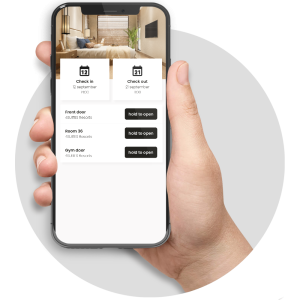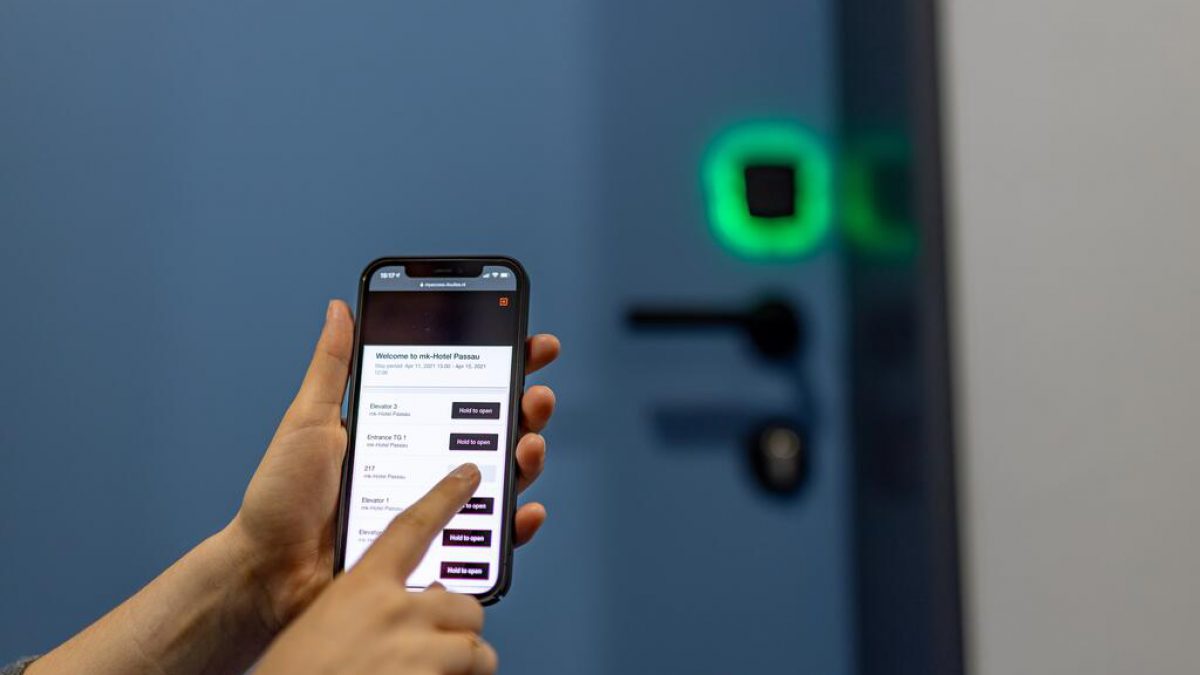This Is Why You Need Smart Mobile Keys In Your Hotel
Updated November 2022
The popularity of mobile keys has skyrocketed in recent years. Considering their advantages, this is hardly surprising.
Mobile keys can improve the guest experience and strengthen loyalty. They simplify hotel operations, lower labour and material costs while reducing plastic waste. And finally, they offer the chance to increase sales by connecting to the guest’s favourite device, their smartphone!
The Covid-19 pandemic has helped popularise mobile key technology in the hospitality industry. Mobile key technology was created many years ago, but in the past few years, mobile keys have become more popular as a technology that helps people minimize in-person interactions. As a result, this technology saw the second-largest increase during the pandemic after mobile check-in, according to a survey by New York University (NYU).
If you are looking to introduce this technology to your property, you have two options: Bluetooth or the next generation of mobile keys that use the Internet of Things.
Which one is better? The title gives our opinion away, but let’s look at the ‘why’ behind it. Learn how the Internet of Things (IoT) can benefit your guests, team, and hotel as a whole.

Bluetooth vs. cloud access systems
Here’s a look at how Bluetooth vs. cloud access systems work. It is possible for guests to enter their rooms without a physical key in both cases. Instead, people use their own devices to unlock doors. These two systems differ in how they grant access.
Bluetooth-powered mobile keys:
It is necessary for guests to download an app, whether it is the hotel’s app or the access system’s app. An encrypted token is created by this app. When the guest holds their phone close to the hotel lock, the token is sent from the phone to the lock. It takes about two seconds for the door to open.
Cloud-based smart mobile keys:
Guests do not have to download an app, they receive a link via email or SMS as part of their confirmation email. Clicking this link opens the web app. Once the guest presses the button within the app, the door opens immediately.
Key Benefits of cloud-based mobile keys
1. Improved guest experience
Your hotel technology should always aim to make your guests’ stay smoother and more enjoyable. Your chances of achieving this are higher if you use a simpler technology solution.
Since Bluetooth-powered access systems are more difficult to use, fewer guests will use them. Guests may not know how to control the Bluetooth settings on their devices, they don’t want to download an additional app to access their room or they get frustrated by the time it takes to open the door, causing frustration and negatively impacting your guests’ experience.
With a webapp-powered system, guests can get their access link via their usual email app or a standard SMS. They don’t need advanced knowledge and a tap on the phone is enough to open doors immediately. This creates a smoother experience for your guests and your staff (because they won’t have to troubleshoot). It also allows you to take the final hurdle to offering a fully digital guest experience thanks to the Internet of Things.
Optimising the guest experience with intelligent access.
2. Reduced costs
The most obvious advantage of implementing a keyless entry system for hotels is its cost effectiveness. Keyless entry systems only incur one-time costs when they are developed and only need to be activated and deactivated afterwards.
Traditional plastic cards incur costs for printing, programming, replacement, theft and loss, and hacking, some of which can be significant. A mobile key system may feel expensive in the short term, but in the long term it brings significant efficiency gains and cost savings that directly impact the guest experience.
A cloud-based keyless room access system is a software as a service system and therefore only requires a simple upgrade. These upgrades can be performed by the app developer or your official hotel data security provider.
3. Quicker staff training and onboarding
The easier your access system is for employees to use, the more it helps them save time and streamline operations. They’ll also be more willing to recommend a simpler system to guests, further increasing adoption.
The team’s rollout phase for a web app-based system is quick because everything runs in the background. The PMS and access system are integrated and automatically send web app links to guests. Your employees do not have to do any extra work.
Since Bluetooth-based systems are more complicated overall, you’ll have to invest more time in training and familiarising your team. Then you have to explain downloading, registration, and mobile key to guests. This takes much more time than simply asking guests to click on a web app link in their email and press a button to open the doors.
“The easier your new tech solutions are for your employees and guests, the higher your adoption rates and the more benefits you’ll see at every level of your business.”
4. Improved security
After the numerous cases of security flaws in plastic cards and their access systems, the mobile key is a phenomenal upgrade that ensures both cyber and physical security for hotel guests.
Security is an important point that all hotels want to offer their guests. Although both Bluetooth and webapp-based mobile keys do their best to provide maximum security, there are differences.
With the Bluetooth solution, a token is stored on the guest’s phone and sent to the door to unlock it. This direct communication and data transmission can pose a security risk. The webapp-based mobile key, on the other hand, does not shop any data on the device. Instead of sending a direct signal between the phone and the lock, everything goes through the cloud, which increases security.
Hotel owners need to be aware that implementing a secure and highly efficient mobile room key system requires consistency and reliability. Since such a system requires access to the hotel PMS and third-party software, it should be contracted to a trusted hotel technology company that can manage the entire service with the highest level of security.
5. Future readiness
Cloud-based mobile keys use a cloud-based system and allow for Over-the-air (OTA) updates. This automatically updates all devices throughout your properties as they’re connected via the Internet of Things. This keeps your security and technology up to date. Cloud technology also simplifies integration with other apps via an open API and offers more options to change direction in the future.
A Bluetooth-based solution isn’t connected to the cloud, so you don’t get automatic system updates. You’re also locked into your choice and may have to start from scratch the next time you develop a new access system.


